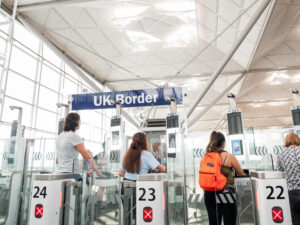Police secretly conducting facial recognition searches of passport database
Published on 08 January 2024
Passengers using ePassport gates at UK border control, Stansted Airport. Image: Alex Segre / Alamy Stock Photo

Revelation sparks concern among MPs and watchdogs over implications for data protection and relationship between the citizen and the state
Reports Mark Wilding for Liberty Investigates and Charles Hymas for the Telegraph. Edited by Harriet Clugston, Liberty Investigates’ editor.

